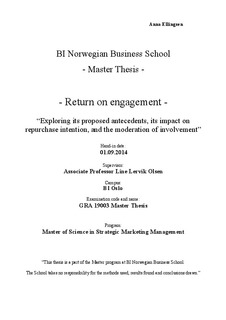Return on engagement : exploring its proposed antecedents, its impact on repurchase intention, and the moderation of involvement
Master thesis

View/
Date
2015-08-07Metadata
Show full item recordCollections
- Master of Science [1621]
Abstract
Every now and then, powerful consumer trends emerge. Companies have no other
choice but to familiarize and adapt to the most powerful ones. Online social media
are one of these trends, as it has revolutionized the way humans interact with each
other. Only in the last decade, we have witnessed major upheavals.
Facebook.com, which is today by far the world´s largest social media platform,
was the first social media that was accepted and used by a large set of the
population. Witnessing this trend, customer engagement is more important now
than ever before. Consumer engagement is a field where a lot of research has been
done. Hence, return on engagement, which can be said to be what you as a
company get back from engaging with your customers, is a field where research is
lacking. With this I wish to fill a gap in the consumer engagement literature.
As such, the core of this master thesis is to explore and empirically test how trust,
perceived risk, and prior experiences with a company ultimately affect consumer´s
return on engagement. Further, it investigates consumers repurchase intentions in
terms of the links that companies are posting on Facebook. In other words, this
thesis is investigating how companies can successfully connect with their
customers for long-term profitability. All of the variables included in the model
are operationalized through multiple indicators. They are measured through a
cumulative approach meaning the customer´s total experiences and perceptions
with and of companies while being logged onto Facebook. Finally, category
involvement is investigated as a potential source that can cause the relationship to
change. To gather data I created a survey based on previous established and
validated scales, which were adjusted for the purpose. The surveys were
distributed online, mostly through Facebook, to reach the right kind of
respondents to include in the study. The results points to several interesting
findings, and generally prove areas worthy of further investigations.
Description
Masteroppgave(MSc) in Master of Science in Strategic Marketing Management - Handelshøyskolen BI, 2015